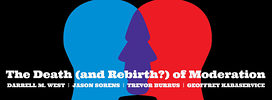Lead Essay
Growing political polarization has made it difficult for the American left and right to understand one another, much less to work together. Darrell M. West blames several factors for this, including our electoral system itself, the news media, and low voter turnout — a state of affairs in which nearly by definition, only those with extreme views will vote. He suggests several measures to make it easier to vote and floats the idea of mandatory voting as well. He also recommends conscious, real-world engagement with our nominal political enemies and widening our menu of information sources.
Response Essays
Jason Sorens says that moderation is not the same thing as tolerance, pragmatism, or open-mindedness. Moderation hides political problems rather than solving them, and often it perpetuates evil. Parties with sharp ideological differences give voters a meaningful choice, which is surely a virtue in a democracy. Party discipline should be stronger, he says, as this, and not moderation, will counteract tribalism.
We fail to be moderate, says Trevor Burrus, because so much is at stake. The way to moderation is by lowering the stakes and devolving more authority to state and local governments. A widely diverse electorate of 330 million people cannot possibly be expected to agree on all the things that present-day politics demands of it. Today a razor-thin national majority is sufficient to enact many sweeping policy changes that bind on everyone, and it should thus be no surprise that our politics are acrimonious. The results won’t change until the system itself changes.
Geoffrey Kabaservice blames the Republican Party for the partisanship on display in recent American politics. If moderation means an occasional willingness to break the ideological mold, this is the quality he believes to be lacking, and he has little optimism about its return. Meanwhile declining life expectancy, climate change, and rising federal debt are all major problems in need of broadly appealing solutions.
Coming Up
Conversation through the end of the month.
Related at Cato
Event: “Sphere Summit: Teaching Civic Culture Together,” July 14-19, 2019
Research Brief: “The Internet, Political Polarization, and the Election of 2016,” by Levi Boxell, Matthew Gentzkow, and Jesse M. Shapiro, November 1, 2017
Cato Unbound: “An Appreciation of Partisanship,” February 4, 2009

